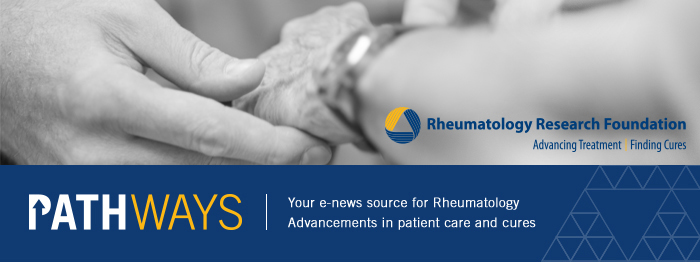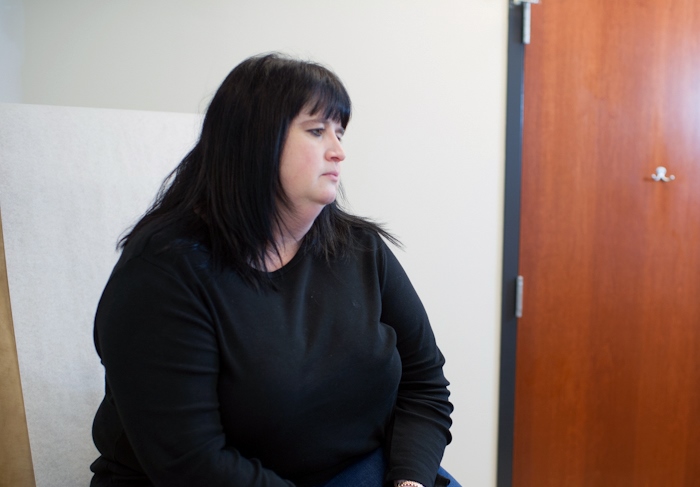Pathways

Volume 6 • Issue 5 • May 2017 • Rheumatology Research Foundation

Raising Awareness, Searching for Cures
May is recognized as National Arthritis Awareness Month, a time to raise awareness of the disease that impacts 54.4 million adults.
Arthritis can turn simple daily tasks into huge obstacles. Melissa Young of Mendham, New Jersey, who is learning to manage her rheumatoid arthritis explains, “It’s not just little decisions like not buying an 18 pound turkey because I have a hard time lifting it onto the table. It’s also big decisions about where I’m going to live and what job I’m going to do.”
Of the adults living with arthritis, 30 percent find difficulty in common movements like bending or kneeling, and 20 percent are unable to walk three blocks. The effects not only impact quality of life, but also have economic consequences. Arthritis and other musculoskeletal problems are the number one cause of disability in America, and arthritis-related medical costs account for at least $81 billion a year.
As the population ages, the prevalence and expense of arthritis is expected increase. By 2040, it is estimated that 78.4 million adults will have doctor-diagnosed arthritis. With many rheumatologists preparing for retirement, there will be an estimated shortage of 3,845 rheumatologists in the United States by 2025. Fewer rheumatologists will mean longer wait times for patients like Nancy Collins Gelpi of Augusta, Georgia. “If the rheumatologist says he wants to see you back in 8 weeks, you’re lucky if they can schedule back in by 12 weeks. Also, my rheumatologist is of retirement age. I’m not sure where I’ll go when he retires.”
The Rheumatology Research Foundation is working to address the challenges faced by people with rheumatic diseases like arthritis. By funding education and training awards for medical students and young doctors, the Foundation is increasing the number of rheumatology health professionals dedicated to treating arthritis. The opportunities expose health professionals to rheumatology, encourage them to pursue a career in the field, and prepare them to become the next generation of rheumatology experts.
In addition to recruiting and training tomorrow’s rheumatologists, the Foundation also funds research that explores the cause, progression, and treatment of rheumatic diseases. Breakthroughs could lead to new treatments, prevention techniques, and one day, a cure for rheumatic diseases. Click here to see examples of the groundbreaking research being funded by the Foundation.
Want to help? Learn how you can join the Foundation on its mission to improve the health of people with rheumatic disease.
Meet people who are living with rheumatic diseases, and learn what the Foundation is doing to help. In this #RheumLife series, we will share patients' perspectives of life with rheumatic disease and feature the Foundation-funded researchers who are working to advance treatments and find cures. Visit the improving patient care page to to read more stories, or share your experience with us on Facebook or Twitter.
#RheumLife: Measuring 'Invisible' Symptoms

Rheumatic diseases are sometimes referred to as “invisible illnesses.” A person with a rheumatic disease might appear to be perfectly healthy, but he or she is actually struggling just to get out of bed in the morning. Many patients experience fatigue, pain and depression that can be difficult for others to see. Researchers are working to better understand the root cause of these symptoms and could one day find a way to measure the disease’s impact on the brain.
|
 Elizabeth Aline Elizabeth Aline
|
Patient Perspective
“I make no plans. I sleep as much as possible. I do nothing strenuous. If I try to do an activity of any kind, I make sure I have the next day to recover. It is depressing, frustrating, painful and exhausting," explains Elizabeth Aline of Haverford, Pennsylvania.
|
 Jarred W. Younger, PhD Jarred W. Younger, PhD
|
Efforts to Help
Approximately half of individuals with rheumatoid arthritis experience profound fatigue and pain, even after their joint disease activity has been improved by medications. The symptoms suggest that the inflammation caused by rheumatoid arthritis might also impact the brain and nervous system. Jarred W. Younger, PhD, associate professor at the University of Alabama at Birmingham, is studying brain thermometry, a noninvasive method that could detect and measure the neuroinflammation caused by rheumatoid arthritis. His technique could help doctors better understand the cause of the pain and fatigue experienced daily by people like Elizabeth.